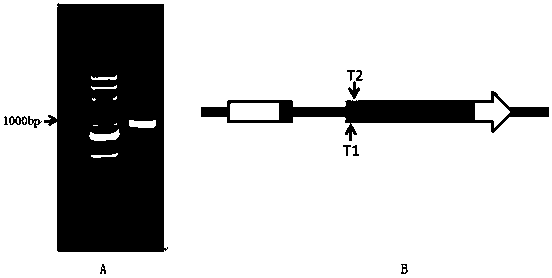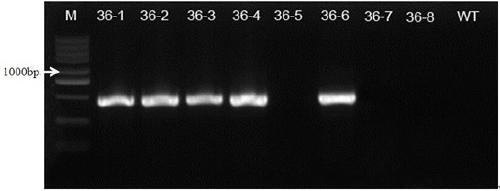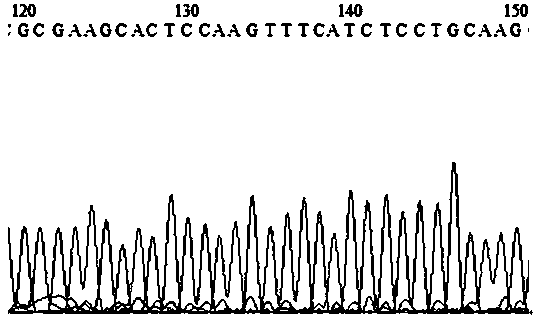A method for increasing the content of 5-methyltetrahydrofolate by gene knockout
A methyltetrahydrofolate and gene knockout technology, applied in the fields of genetic engineering and molecular biology, can solve problems such as folic acid deficiency, DNA methylation level and pattern changes, and cover up vitamin B12 deficiency, etc., to alleviate invisible hunger, Effect of increasing folic acid content
- Summary
- Abstract
- Description
- Claims
- Application Information
AI Technical Summary
Problems solved by technology
Method used
Image
Examples
Embodiment 1
[0027] Example 1 Corn ZmGFT1 Construction of gene knockout vector and acquisition and identification of transgenic plants
[0028] (1) The leaves of corn inbred line C01 were collected, the total RNA of corn was extracted by Trizol method, and the cDNA of corn was obtained with RevertAid FirstStrand cDNA Synthesis Kit (Thermo). Using maize cDNA as a template, Primer1 (SEQ ID NO.5) / Primer2 (SEQ ID NO.6) as amplification primers, amplified the CDS full length of the GRMZM2G124863 gene ( figure 1 A).
[0029] (2) Referring to the results of the sequencing sequence, design two target sites in the genomic region corresponding to the GFT1 exon ( figure 1 T1 and T2 of B, design website: http: / / cas9.cbi.pku.edu.cn / index.jsp), these two targets have common characteristics in the genome, NGG at the 3' end (N is A , T, C, G any base), the sequence is SEQ ID NO.3 and SEQ ID NO.4.
[0030] (3) Referring to the method of gene knockout vector construction (Li CX, Liu CL et al., 2017, P...
Embodiment 2
[0040] Example 2 ZmGFT1 Detection of gene knockout maize transcription level
[0041] Will ZmGFT1 The negative transgenic T0 generation plants with gene knockout and no CRISPR / Cas9 recombinant plasmid were selfed to obtain stable genetic ZmGFT1 Gene knockout T1 generation line. Will ZmGFT1 The gene knockout T1 generation plants were selfed, and the grain materials 25 days after pollination were taken, frozen in liquid nitrogen, and ground into powder, and total RNA was extracted using a total RNA extraction kit (purchased from Beijing Yuanpinghao Biotechnology Co., Ltd.). RevertAid First Strand cDNA Synthesis Kit (Thermo) was used to obtain cDNA. Transgenic plants were detected by qRT-PCR detection kit (purchased from Beijing Quanshijin Biotechnology Co., Ltd.) ZmGFT1 gene transcription levels. PCR reaction system: DNA template 1 μl, Primer9 (SEQ ID NO.13) 0.4 μl, Primer10 (SEQ ID NO.14) 0.4 μl, Dye II 0.4 μl, 2X Buffer 10 μl, ddH 2 O 7.8 μl; PCR amplification program: ...
Embodiment 3
[0042] Example 3 ZmGFT1 Determination of Folic Acid Content in Gene Knockout Maize
[0043] Utilize high performance liquid chromatography mass spectrometry to measure described in embodiment 2 ZmGFT1 Folic acid content in leaves and grains of transgenic maize (including monoglutamic acid-tailed 5-methyltetrahydrofolate, diglutamic acid-tailed 5-methyltetrahydrofolate, triple-glutamic acid-tailed 5-methyltetrahydrofolate). Organs tested included fresh leaves 70 days after planting and fresh seeds 25 days after pollination.
[0044] The result is as Figure 6-8 as shown, ZmGFT1 The content of 5-methyltetrahydrofolate, the main form of folic acid, in the leaves and grains of transgenic maize was significantly higher than that in the control (wild type). In fresh leaves planted for 70 days, the gene knockout mutants had about 2.01-2.23 times more monoglutamic tail 5-methyltetrahydrofolate and 2.23 times more diglutamic tail 5-methyltetrahydrofolate than the wild type. Increa...
PUM
 Login to View More
Login to View More Abstract
Description
Claims
Application Information
 Login to View More
Login to View More - R&D
- Intellectual Property
- Life Sciences
- Materials
- Tech Scout
- Unparalleled Data Quality
- Higher Quality Content
- 60% Fewer Hallucinations
Browse by: Latest US Patents, China's latest patents, Technical Efficacy Thesaurus, Application Domain, Technology Topic, Popular Technical Reports.
© 2025 PatSnap. All rights reserved.Legal|Privacy policy|Modern Slavery Act Transparency Statement|Sitemap|About US| Contact US: help@patsnap.com



